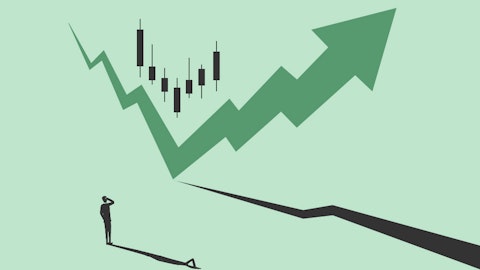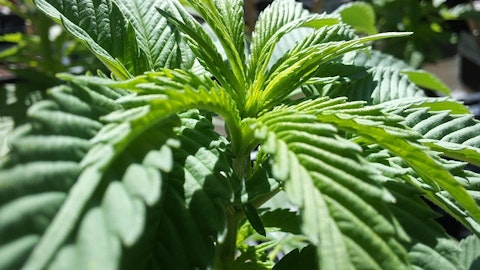It’s a $10 billion projected growth at retail. It’s still a big market and it prepares a lot for when legalization does happen in the U.S. And just to step back, you only asked me about Canada, as you see in our headlines today, is we don’t rate and house anywhere in the near future, legalization happening in the U.S. We very much like beer and spirits business with great margins in those businesses. We see great growth opportunities. We have an excellent management team both with Brian Nolte and with Ty Gilmore now in running those businesses. And we’d love to find some more Breckenridges or some more Montauk and SweetWater. We’re now also focused on that wellness business. We’ve been very successful with Manitoba Harvest. And we think with that, from an acquisition standpoint, the whole wellness area is an area we’re going to focus on and look at acquisitions there.
And upon legalization, there will be foods that will be infused with hemp. There’ll be foods that will be infused with THC. And that’s why the name of the Company is Tilray brands. We’re a diversified company focusing on adult-use cannabis, medical cannabis, beer, spirits and wellness products. And we, as a team, have a lot of experience in that. So there’s a major focus on additional acquisitions and to diversify this company. Because we don’t know when legalization is going to happen in the U.S. and we want to grow this business as we’ve always said out there.
Operator: Our next question is from the line of Owen Bennett with Jefferies. Please proceed with your question.
Owen Bennett: Well. I just wanted to come back to your comments around exploring manufacturing partnerships with other LPs in Canada. And you said, I believe, if I heard correctly, you’ve been reaching out around this. Could you maybe give some more details here what these agreements would look like exactly? Have you had any initial interest? And then obviously, you’re able to do this due to spec capacity in your facilities currently, what would happen when demand increases and you perhaps need that your own product again. Thank you.
Irwin Simon: So I’m going to let Blair answer that because he’s the one out there doing that. But let me tell you something. We have the ability to grow in our facilities over 265,000 kilos. We have facilities in the West Coast in Vancouver, and we have other facilities that we’ve taken down since the Tilray acquisition. So right now, I’m not worried that we run at the capacity — and let me tell you something to fill it up to 265,000 kilos will change our financial lease tremendously. And with that, we have the ability to grow. The other thing is we look at facilities today, there’s food shortages in the world have let us tomatoes, strawberries. And we’re looking at utilization potentially where do some of these facilities if we have.
We’re overcapacity, how do we start growing fruits and vegetables in some of these facilities and supply food to the world where there’s major shortages and there’s price opportunities there. So, one thing I want to make sure is where utilization assets. We’re giving cash, we’re generating cash, and we’re growing the Tilray brands company. Blair, do you want to address that in regards to some of the stuff that you’re working on in Canada?
Blair MacNeil: Yes. Thanks, Irwin, and thanks, Owen, for the question. Very fair, Irwin hit it right on the nose. We’ve got a tremendous amount of capacity on the flower production side at a low-cost opportunity. We’ve got beverage capability. We have vape capability not just distillate vape, but BHO live resin. We have just a tremendous facility. The team has done an unbelievable job of building world-class facilities that can operate at a very low cost. And we know in the industry today, a lot of our competitors are focused on survivability and not sustainability. So for us, it’s an opportunity, I think, to utilize some of our excess capacity and help our industry thrives and get to that $10 billion industry in Canada and $100 billion globally.




